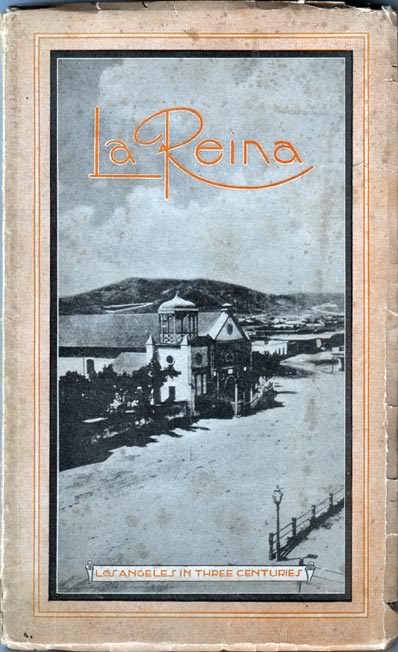El Pueblo de Nuestra Señora la Reina de los Angeles del Río de Porciúncula
Am I alone in thinking that this sounds just a wee bit contrived? There are probably more letters in this name than there were residents in the original settlement!
Well, it so happens that recently I found out that I'm not alone in my suspicions. Buried in the references of the Wikipedia entry for Los Angeles is this notation:
There is some question about the legitimacy of this name, which may have, through a series of misinterpretations and inflations, been corrupted from the actual name authorized in writing in 1781, "La Reina de Los Angeles". Cf. Theodore E. Treutlein, "Los Angeles, California: The Question of the City's Original Spanish Name", Southern California Quarterly 55, no. 1 (Spring 1973): 1-7. Historian Doyce B. Nunis, Jr., has traced the longer name to the histories written by the Franciscan missionaries, especially Francisco Palóu, who wished to play up the region's connections to their order. Pool, Bob, "City of Angels' First Name Still Bedevils Historians". Los Angeles Times (March 26, 2005), Sec. A-1.
Notate bene that this reference states unequivocally that, "the actual name authorized in writing in 1781 [was], 'La Reina de Los Angeles' (The Queen of the Angels)." If this is true, then why, oh why, should the absurdly long mythological name be further perpetuated?
Another picky-picky-picky observation on my part...
La Reina de Los Angeles
Consider: the city was named for the Queen (La Reina) of the Angels, not the angels (Los Angeles) themselves. So shouldn't the short form of the Spanish name be "La Reina?" It's not the "City of the Angels," as you always hear, it's actually the city of the Angels' Queen. Where did this go wrong? The original settlement name of San Diego was "San Diego de Alcalá," but we don't call it Alcala today, nor did what was first dubbed "San Francisco de Asís" end up being called Asis. The cities were named for St. James and St. Francis respectively, not their referential associations.
I'm sure we can thank the Americans for the bastardized name, "Los Angeles." If the old town had remained Mexican through its entire history, I have little doubt that today the city would be called "La Reina" instead.
Post scriptum: As you can see, at least one book on Los Angeles history got it right. ;)

La Reina - Los Angeles in Three Centuries, Published by Security Trust & Savings Bank, Los Angeles, 1929.
3 comments:
Scott-- I have a copy of La Reina-- now I understand better its title. Btw: while it's not about the past in terms of buildings, I have a question about "Los Angles past": any thoughts on the older pronunciations of "Los Angeles"-- sometimes heard in movies-- "Los Ang-less" for example--?
"Los Ang-less." Interesting! I vaguely remember hearing this variant. One unusual thing I've encountered in my postcard-collecting hobby is people referring to Los Angeles as simply "Los." As in, "Oh, you must visit Los someday!" Strange!
Be sure to watch the excellent 1991 neo-noir "The Grifters." Anjelica Huston calls it Los Angle-lees.
A great shot at the very end... she drives by the old Sheraton Town House http://wikimapia.org/3667291/Town-House-Hotel-former
Wes Clark
I love this blog...
Post a Comment